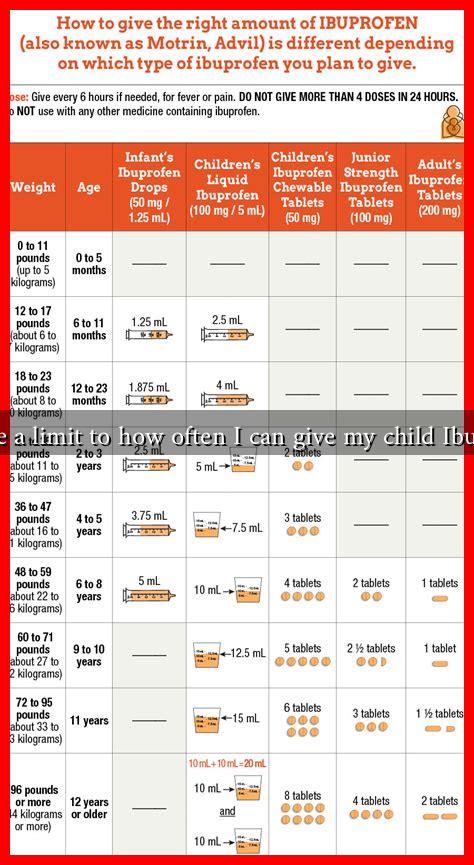-
Table of Contents
Is There a Limit to How Often I Can Give My Child Ibuprofen?
As a parent, ensuring the health and well-being of your child is a top priority. When your child is in pain or has a fever, you may consider administering over-the-counter medications like ibuprofen. However, it’s crucial to understand the appropriate usage, dosage, and frequency of this medication to avoid potential risks. This article explores the limits of ibuprofen administration for children, providing valuable insights and guidelines.
Understanding Ibuprofen
Ibuprofen is a nonsteroidal anti-inflammatory drug (NSAID) commonly used to relieve pain, reduce inflammation, and lower fever. It is available in various forms, including liquid suspensions, chewable tablets, and standard tablets. While ibuprofen is generally safe for children when used correctly, it is essential to adhere to recommended dosages and frequency.
Recommended Dosage for Children
The dosage of ibuprofen for children is typically based on their weight and age. The general guidelines are as follows:
- For infants aged 6 months to 2 years: 5-10 mg/kg every 6-8 hours as needed.
- For children aged 2-12 years: 10 mg/kg every 6-8 hours as needed, not exceeding 40 mg/kg in a 24-hour period.
It is crucial to use the measuring device that comes with the medication to ensure accurate dosing. Overdosing can lead to serious health complications, including kidney damage and gastrointestinal issues.
Frequency of Administration
Ibuprofen can be given every 6 to 8 hours, but it is essential to monitor your child’s condition closely. Here are some key points to consider:
- Do not exceed the maximum daily dosage as recommended by your healthcare provider or the medication label.
- If your child’s symptoms persist beyond three days, consult a healthcare professional.
- Always allow at least 6 hours between doses to prevent potential overdose.
Potential Risks of Overuse
While ibuprofen is effective for managing pain and fever, overuse can lead to several health risks:
- Kidney Damage: Prolonged use or high doses can strain the kidneys, especially in dehydrated children.
- Gastrointestinal Issues: Overuse may lead to stomach ulcers or bleeding.
- Allergic Reactions: Some children may experience allergic reactions, including rashes or difficulty breathing.
According to a study published in the Journal of Pediatric Pharmacology and Therapeutics, inappropriate dosing and frequency of ibuprofen can lead to significant adverse effects in children. Therefore, it is vital to follow guidelines and consult a healthcare professional when in doubt.
When to Seek Medical Advice
There are specific situations where you should seek medical advice before administering ibuprofen:
- If your child is under 6 months old.
- If your child has a history of kidney problems or gastrointestinal issues.
- If your child is taking other medications that may interact with ibuprofen.
- If your child’s fever exceeds 104°F (40°C) or lasts more than three days.
Conclusion
In summary, while ibuprofen can be an effective tool for managing pain and fever in children, it is essential to adhere to recommended dosages and frequency to avoid potential risks. Always consult with a healthcare professional if you have concerns about your child’s health or if symptoms persist. By understanding the limits of ibuprofen use, you can ensure your child receives safe and effective care.

